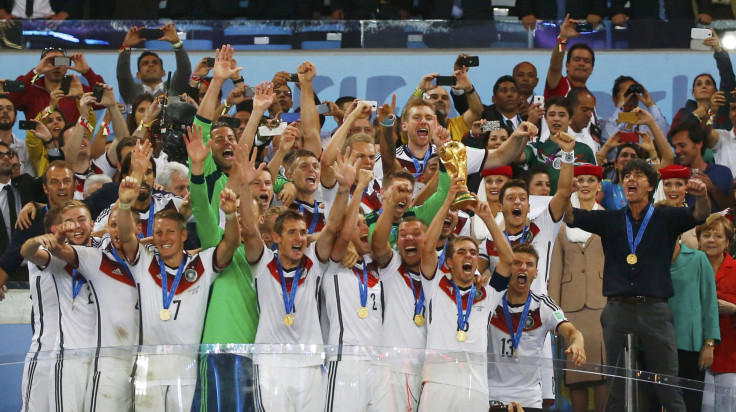Best World Cup Ever? 2014 Will Be Remembered For Thrilling Group-Play Matches And Brazil's Epic Defeat To Germany

Less than 24 hours after Germany became world champions for the fourth time, the dust is settling on what will go down as one of the greatest World Cups of all time, but more importantly a tournament that made the World Cup great once again.
Goals flowed at an unprecedented rate in the group stage and, while they dried up noticeably thereafter, there was more than enough tension to prevent it petering out before a final that was surely the best since 1986. There was a match that will be discussed forever more, with the most successful team in the history of the World Cup humiliated on home soil in the semifinals. While unpleasant, there was also an incident that will live on in montages of the World Cup’s Most Shocking Moments when Luis Suárez sunk his teeth into Italian defender Giorgio Chiellini.
Whether it was the greatest World Cup ever will be much debated, what is clear is that it greatly surpassed widely held expectations just over a month ago. In the spiritual home of the beautiful game, though the hosts fell short of living up to their own legacy, international soccer garnered a much-needed shot in the arm.
The prestige of the UEFA Champions League has seen the European club game become king in recent years. With the world’s top players increasingly concentrated in an ever small number of clubs, there is little doubt that it is the Champions League where the best soccer is now to be found. The globalization of the game and modern technology has similarly robbed the World Cup of the discovery of new players to cherish. Tactical innovations, too, are now the domain of club teams. Left with mere weeks to get their players together and organize them for the World Cup, it is little surprise that so many international coaches have chosen the simplest method and set up their players to be merely difficult to beat. Unsurprisingly the average number of goals per match in World Cups has decreased steadily since 1994.
Very quickly there was a sense that 2014 and Brazil would be different. The Netherlands’ 5-1 victory over holders Spain on day two set a tone that was to be continued throughout a thrilling group stage. Even teams like the Dutch, set up as counter punchers, attacked with real pace and vigor. Costa Rica provided the World Cup’s Cinderella story using exactly this method to top the first group ever featuring three former World Cup winners.
Spain’s golden era was brought to a dramatically early end, but it was arguably the tactical revolution they had brought about and the adopters and reactionaries to their high pressing, possession style which had spurred so much entertainment. Simply sitting back and hoping for the best was no longer good enough.
Perhaps expectedly, both goals and upsets came in much shorter supply once the lose-and-go-home anxiety of the knockout rounds took over. Still, the second round produced a classic between Brazil and Chile and two memorable games that finished 0-0 after 90 minutes. Germany’s celebrations at the Maracanã on Sunday were so nearly confined to fantasy by Algeria, while the United States battled ferociously against a more talented Belgium. The U.S. ultimately exited in the last 16 once again, but some memorable moments both from Jurgen Klinsmann’s side and the tournament as a whole, coupled with ESPN’s dedicated coverage, helped burst soccer out of the niche category on these shores once and for all.
Crucial to any truly great World Cup, the stars came to the party. Lionel Messi fell agonizingly short of emulating Diego Maradona in 1986, but still came up with decisive moments to carry Argentina through its first five matches. The tournament’s poster boy Neymar also coped with incredible pressure admirably before his tournament was cruelly ended and his team’s paper-thin bubble was soon dramatically burst. A star was born, too, with a Colombian named Rodriguez taking the other pronunciation of James to the English-speaking mainstream and walking home with the Golden Boot.
Unfortunately the quarterfinals were a damp squib, with just six goals scored and caution taking over. Argentina and the Netherlands fought out a similarly themed semifinal, too. In the other last four clash, Germany served up a beating on the hosts that created a landmark match, but one that at the time was more car-crash television than true healthy entertainment.
The World Cup needed a true to-and-fro battle in the latter stages to secure its legacy. Perhaps the final provided it. The current generation has been denied a great finale, with France against Brazil in 1998 serving up the most goals, three, since 1986, and even that being a one-sided anticlimax. Germany and Argentina didn’t match that, in fact it took 113 minutes to simply provide a goal, but it had nearly everything else. Had the finishing been better it could easily have equaled the five goals produced between the same teams 28 years ago.
Messi missed a gilt-edged opportunity to join the sport’s immortals and there was controversy with Germany goalkeeper Manuel Neuer escaping punishment for an ugly challenge on Argentina striker Gonzalo Higuaín. Both teams had golden chances to settle the final before Mario Götze etched his name into history with a dramatic finish that meant the 2014 World Cup joined France ’98 with the most goals ever.
Germany’s infrastructural revolution had reaped the ultimate benefit and their incredible depth in quality spread throughout the squad had deservedly triumphed. But the World Cup was the real winner. First-time viewers around the world got to see that, despite the unsavoriness of the sport’s rulers, FIFA, and dominant cult of the club game, nothing can captivate quite like the world coming together for a festival of international soccer once every four years.
© Copyright IBTimes 2025. All rights reserved.





















